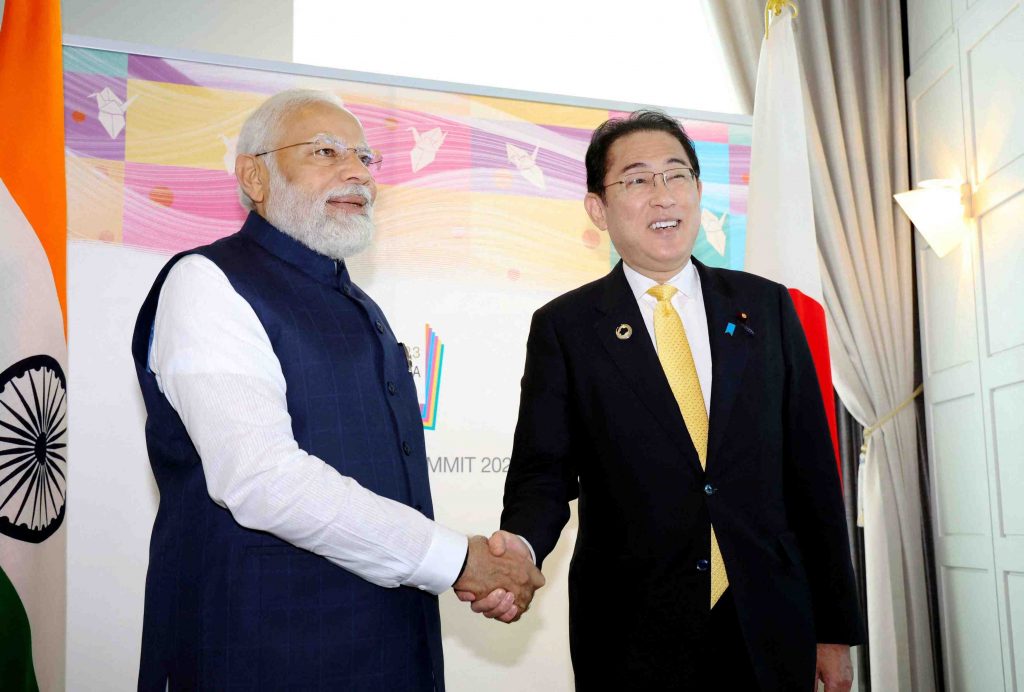
US President Joe Biden speaks with Indian Prime Minister Narendra Modi (left) as he arrives at the White House in Washington, June 21, 2023. (© AP via Kyodo).
During the recent White House meeting between United States President Joe Biden and Indian Prime Minister Narendra Modi, the two sides agreed to strengthen defense cooperation and coordinate efforts in advanced technology fields. US-India collaboration is essential to deter China from further expanding its military influence in the Indo-Pacific region.
Hopefully, the two countries will work to further strengthen bilateral relations based on the meeting outcome.
A joint statement was released following the meeting. It states that the two leaders agreed to joint production in India of fighter aircraft engines developed by the US. They also agreed that US drones would be provided to India. Additionally, US Navy ships will be allowed to be repaired at Indian shipyards.

Geostrategic Background
India and China fought a war in 1962 and have ongoing border disputes. Even now, there are scattered clashes in the border region involving personnel from the Chinese and Indian militaries. India certainly had this situation in mind when it decided to pursue defense cooperation with the United States, particularly as India seeks to enhance deterrence vis-à-vis China.
India has a strong sense of pride as a regional power in South Asia. During the East-West Cold War, it remained steadfastly non-aligned. It refused to side with either the United States or the former Soviet Union.
That India, with such a history, chose to join the Quad framework for cooperation with Japan, the United States, and Australia is no doubt due to one common emphasis. Within the group, the members are concerned with responding to the threat posed by China. India's border confrontation with China forces the Chinese military to divert forces it could otherwise use to attack Taiwan.

The Hard Questions
Prime Minister Fumio Kishida's state visit to India in March and his invitation to Modi to attend the G7 Hiroshima Summit in May are evidence of Japan's desire to forge closer ties with India. Japan, the US, and other countries should proactively use the Quad and similar frameworks to further bolster ties with India.
Nonetheless, it must be admitted that India's stance towards the Russian invasion of Ukraine stands out. It is decidedly more tepid than are those of Japan, the US, and many other countries.
The joint statement issued after the Biden-Modi meeting contains no criticism of Russia nor any mention of sanctions placed on Moscow. However, India's international credibility will be imperiled if it tacitly endorses Russia's disregard for international law. Furthermore, that concern continues as Russia tramples on the principles of territorial integrity and national sovereignty.
Problems at Home
Moreover, the Modi government is under fire for suppressing religious minorities, including Islam, and opposition parties within India. It is also being criticized for the media restrictions it has imposed.
During their summit meeting, President Biden refrained from mentioning human rights issues. That reflects the priority the US is giving to India's strategic value.
India should not take this to mean that the United States has endorsed its policies regarding human rights.
We hope that as the "world's largest democracy" India will act appropriately.
RELATED:
- Arunachal Pradesh: India's Land of the Rising Sun
- [Speaking Out] Will India Become the World's Next Big Power?
- [Asia's Next Page] India from Japan's Perspective: The Russia-India-China Trilateral
(Read the editorial in Japanese.)
Author: Editorial Board, The Sankei Shimbun






